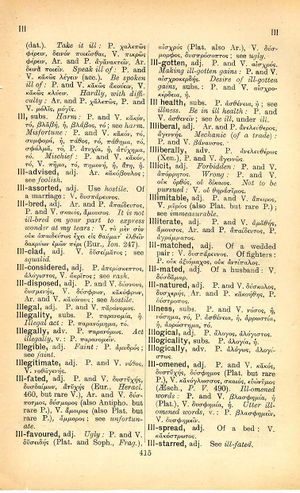ill-bred: Difference between revisions
From LSJ
τὸ ἓν καὶ τὸ ὂν πολλαχῶς λέγεται → the term being and the term one are used in many ways, one and being have various meanings, one and being have many senses
(CSV4) |
m (Woodhouse1 replacement) |
||
| Line 1: | Line 1: | ||
{{Woodhouse1 | {{Woodhouse1 | ||
|Text=[[File:woodhouse_415.jpg|thumb|link={{filepath:woodhouse_415.jpg}}]] | |Text=[[File:woodhouse_415.jpg|thumb|link={{filepath:woodhouse_415.jpg}}]] | ||
Ar. and P. [[ἀπαίδευτος]], P. and V. [[σκαιός]], [[ἄμουσος]]. | ===adjective=== | ||
[[Aristophanes|Ar.]] and [[prose|P.]] [[ἀπαίδευτος]], [[prose|P.]] and [[verse|V.]] [[σκαιός]], [[ἄμουσος]]. | |||
[[it is not ill-bred on your part to express wonder at my tears]]: [[verse|V.]] [[τὸ μὲν σὸν οὐκ ἀπαιδεύτως έχει εἰς θαύματ' ἐλθεῖν δακρύων ἐμῶν πέρι]] ([[Euripides|Eur.]], [[ion]]. 247). | |||
}} | }} | ||
Revision as of 08:55, 20 May 2020
English > Greek (Woodhouse)
adjective
Ar. and P. ἀπαίδευτος, P. and V. σκαιός, ἄμουσος.
it is not ill-bred on your part to express wonder at my tears: V. τὸ μὲν σὸν οὐκ ἀπαιδεύτως έχει εἰς θαύματ' ἐλθεῖν δακρύων ἐμῶν πέρι (Eur., ion. 247).

